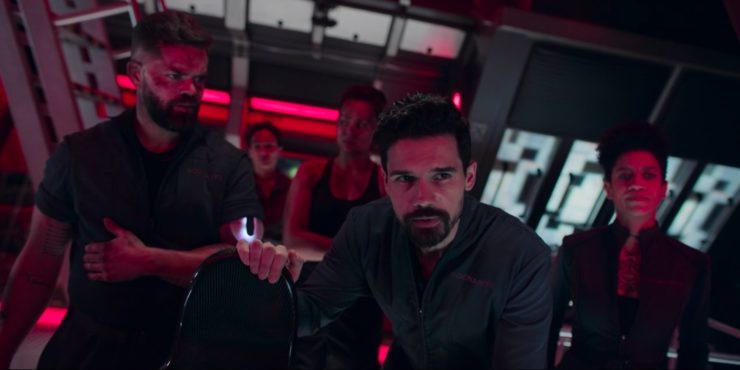The Expanse is over; long may the Rocinante fly. The too-short season six winds things up with “Babylon’s Ashes,” which wraps up as much as it can—and teases stories it seems like The Expanse is never going to get to tell. But as endings go, this one is smart and stacked and satisfying.
Spoilers for the entire show follow!
Sometimes it seems like there are two camps of Expanse watchers: those who are in it for the characters, for the nuance and layers in how Earthers and Belters and Martians bounce off and work with each other, for the family on the Rocinante and the way their actions spread across the stars—and those who are in it for the action and plot and space battles. You can’t really have one without the other, of course. It would be a whole different show. But “Why We Fight” and “Babylon’s Ashes” feel a bit like two parts of one finale, one for each camp: the first part loaded with the quieter, incredibly meaningful moments between people, and the second packed with all the necessary action to get to a stopping point that works as a series finale.
Buy the Book


Sisters of the Forsaken Stars
It wasn’t until my second viewing that the heart of “Babylon’s Ashes” came through for me. Series finales are hard. They’re undoubtedly impossibly hard to make, but they’re also hard for viewers. They can never hit all the points everyone wants them to hit, and it’s a tough task trying to create just the right amount of closure, neither too pat nor too open-ended. There are always other ways a story could have ended—or, in this case, so many ways it could have gone on.
And it has been disappointing that this last season is so short. Yes, the finale is longer; yes, the showrunners and cast and crew have done an incredible job in this season, as for the previous five. But there’s so much depth and richness in this show, and in its source material, that it’s impossible not to wish for more of it.
Or, in some very rare cases, perhaps less of certain bits. I’m still not sure how I feel about the decision to include the “Strange Dogs” story here. As it wound up, with protomolecule-“fixed” Xan and still-human Cara running away from their parents and Duarte staring up at the ship being built in the platform in orbit around Laconia, I still felt like it was a trailer for a show we may never see. It’s not closure for the protomolecule narrative so much as it’s a door opening to another piece of that story— a door I would very much like to walk through.
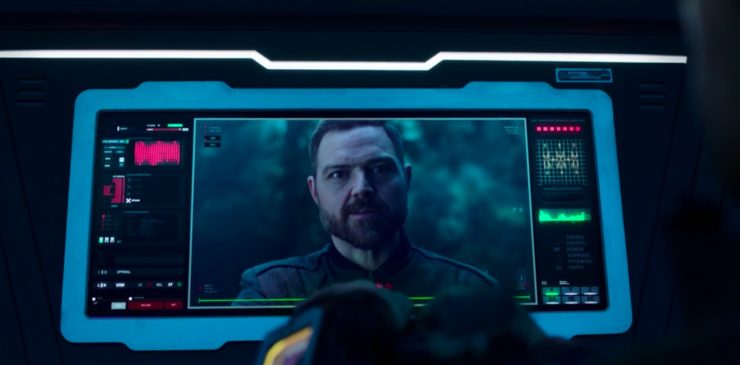
Teasing Duarte’s grand plan to go kill some gods is a little bit of dangling a treat and then snatching it away, but it does strengthen one of season six’s greatest narrative threads: the fact that it is never about Marco. It—meaning the conflict, the war, the bigger picture—has never been about Marco, really, but about everyone whose lives he’s touched, ruined, mocked, belittled, or wasted. It’s only been about Marco to Marco, and the show gave us his perspective for much of last season, then slowly turned, shifting to Filip, who struggles to understand himself as he drifts further and further from his father’s orbit.
When Marco shows himself, in the big multi-fleet battle, it’s in the cruelest, most despicable way: hiding away so that he can rain down hell on his fellow Belters. This has nothing to do with them turning their backs the Belt, but with them rejecting him. It’s personal, and it’s heartless, and it’s so ugly that it was all I could think about for the next ten minutes of the show. It’s a vicious and effective way to show, one more time, who Marco was all along. Drummer’s fleet can’t kill him, but Liang Walker uses his last breaths to at least damage the Pella—and take out Rosenfeld, a loss to which Marco is frighteningly indifferent. His attempt to rally the troops is as transparent as can be; when has Marco ever chanted “Beltalowda”? He only cares for chants of his own name.
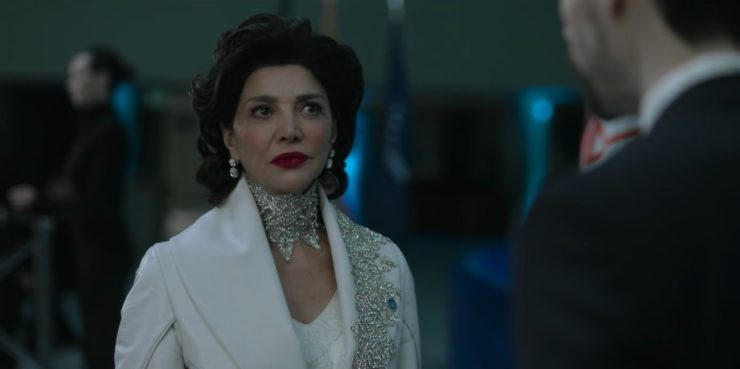
There is too little Avasarala in this episode, but then, there is never enough Avasarala for me, and what we do get is perfect: her meditating in her room on the Zenobia, her moment with the junior officer who’s worried about her presence; the way she tries to control her face when Holden makes his last very Holden move, in front of her and the Belt and everyone. Has she ever worn white like that before? She is the embodiment of peace, even while she’s still threatening Holden with politics. Shohreh Aghdashloo is a treasure, and I hope she’s in every space epic from here until the end of time.
Everyone gets a moment in this finale—a chance for us to remember how far they’ve come and how much they’ve lost, all of it precision-crafted by Ty Franck, Daniel Abraham, and showrunner Naren Shankar. Holden and Bobbie talking about Alex (who’d argue with Martians who claimed the Roci was still a stolen Martian ship) was a lovely way to bring in a character we didn’t need to lose so soon. Clarissa saying “I didn’t use my mods” with that note of pride in her voice. Amos making a big hero gesture while saying it’s just about preferring to die face to face with the enemy. Bobbie Draper, rockets shooting out of her power armor like they were when we first met her in a training exercise on Mars. Naomi understanding that she ought to give Clarissa the same grace she wanted to give Filip. (And her moment with Amos, where they’re finally okay!) Holden acknowledging that this time, they’re killing Marco. This time no punches will be pulled.
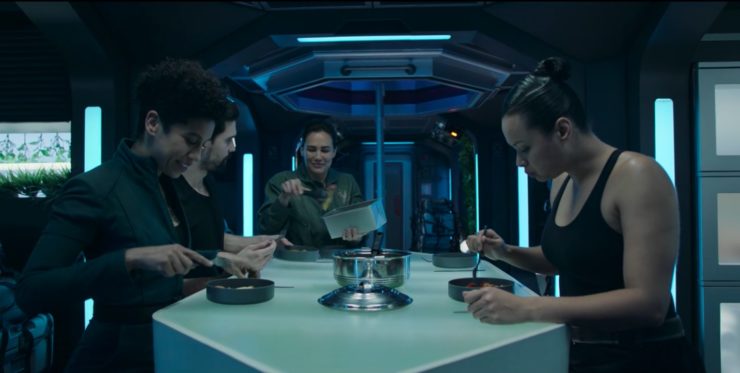
It was extremely clever to keep the shipping-container plan from the audience (though some cheeky bastard did put a shot of it in the trailer for this season; you just don’t know what you’re looking at unless you already know what you’re looking at). Like the Pella reveal, the beginning of the ring station assault is breathtaking, a beautiful image of something absolutely horrible. So much is going on, and director Breck Eisner has a handle on all of it: on the names blinking out on the Roci’s screens, on Amos and Bobbie rattling around in their tiny tin cans, on the rail gun and the Roci and the many, many ways anyone could die in that attack. (That assault team includes an “Idaho, D.” and a “Ripley, E.” They really brought in the big guns.)
There’s a lot of beauty in the unexpected here—in Holden flying the Roci around the edge of the ring space, just ahead of the rail gun fire; in all the colors of the shipping containers and the sheer bravery of every single person who was willing to climb into one of those. (If I have one complaint about how this finale looks, it’s that some of the effects as Amos plummets toward the station are not quite up to par.)
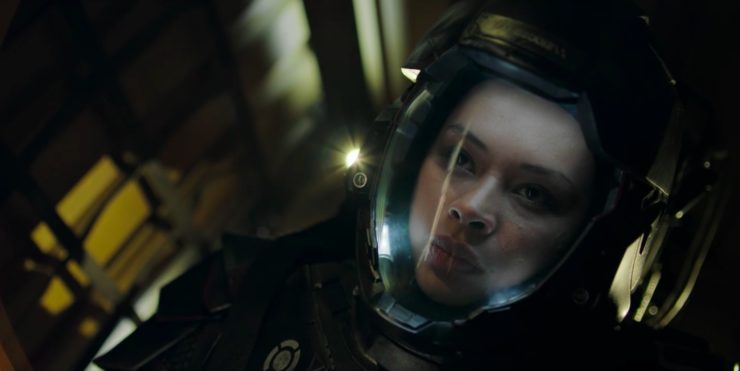
I tend to love the final seasons of my favorite shows, even when (and sometimes because) they’re flawed. They often have an elegiac quality; a mix of hope and loss, love and leaving, that seeps through their scenes. “Babylon’s Ashes” is a story in which a quiet and meaningful triumph is found in the depths of defeat. Plans fail: Marco tricks the fleet, and the ring station plan goes awry when Bobbie has to blow the whole thing up in order to save them all. And when Naomi figures out how to use the ring gates to get rid of Marco, she does so at incredible personal cost. Naomi has done all the log-reading, all the homework, spoken to the expert, solved the question of what triggers the ring entities—and has to use that knowledge to end her enemy and her son.
I’m not sure the show spends quite enough time acknowledging the weight of this. Given how much time we spent on Holden’s unwillingness to kill Filip, I think we needed a moment where everyone who pushed him on that understands what Naomi chooses to do. I want to see it matter to Amos and Bobbie. They’re the first people we see after Marco’s ship gets eaten, but they look happy and relieved, not like they know what this cost Naomi. Everyone has taken heavy losses, but this is something else, and there’s not quite room for the gravity of it.
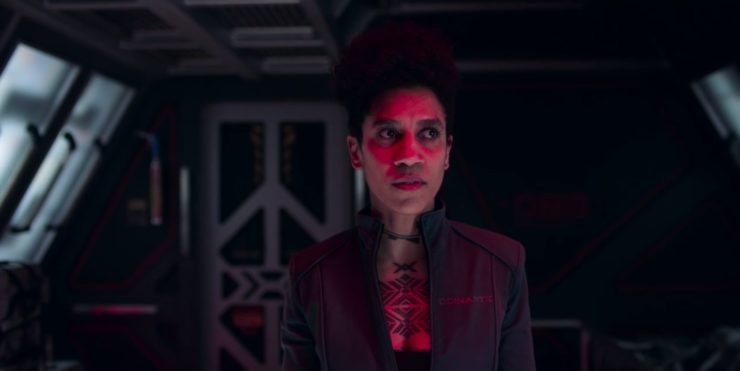
At least the cut to the negotiating table is as gentle as it can be. There’s just enough back-and-forth here to remind us how long these conflicts have simmered, and how repetitive they get, and that somehow, everything always comes out in Earth’s favor.
What Holden does in the end, finally, brilliantly, is make a giant decision with repercussions for all of humanity—after talking to the people it’s going to affect the most. He doesn’t drop the presidency into Drummer’s lap without her consent and her acceptance. He takes power for the sole purpose of giving it up again. It’s something Avasarala would never expect because it would never cross her mind, and she immediately wants to fight him on it. But I think she’s too smart to undo it. It would undo every single thing they fought side by side for, and every single thing Drummer said when she named exactly what has always been done to the Belt:
“I will not be reasoned back into my place. Belters are promised a future so long as it remains convenient. We are given a voice so long as Inners control the comm. We have a vote so long as we can be voted down.”
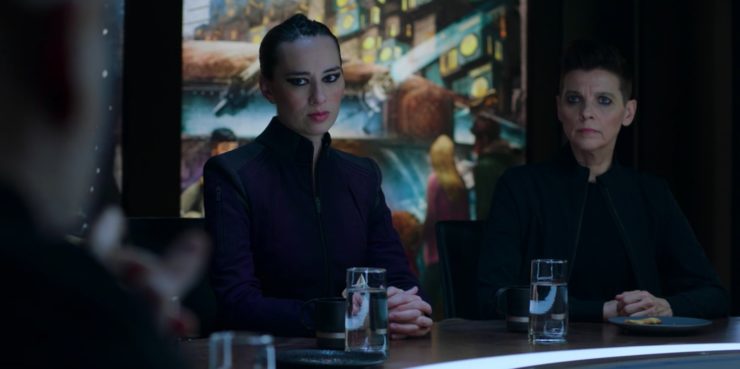
Sometimes you have to break the system to make it truly work for everyone. Sometimes the person with power has to be willing to give that power up. Some systems need to be entirely unmade and rebuilt so that they actually serve the people they are meant to serve. The Expanse, in the end, is a story about doing that—about breaking things to make them better, and about what it really takes to make a better future. Sacrifices are required, and I don’t mean giving up plastic straws. I mean being willing to consider all our systems and who they actually serve.
The Expanse is also a story about a bunch of random people thrown together by strange twists of fate who grow into a family and wind up saving the day a whole lot. They’ve been through so much, from the Cant to Eros to the Behemoth to Ilus to a post-apocalyptic world—and to one more eve-of-battle dinner together on the Rocinante. (An absolutely perfect scene, that one.) But this show is always at least two things. In the same way that it’s space politics and action and it’s a character drama, it’s a story with a huge scope and big stakes and an intimate story about how we can be better, piece by piece, person by person. Systems need changing, but people do, too. And Naomi gets the last word on that when she tells Jim he did the right thing:
“You did. You followed your conscience in the hope that others would follow theirs. You didn’t do it for a reward or a pat on the head. The universe never tells us if we did right or wrong. It’s more important to try to help people than to know that you did. More important that someone else’s life gets better than for you to feel good about yourself. You never know the effect you might have on someone, not really. Maybe one cool thing you said haunts them forever. Maybe one moment of kindness gives them comfort or courage. Maybe you said the one thing they needed to hear. It doesn’t matter if you ever know. You just have to try.”
As she talks, we learn what Naomi will never know: Filip left the Pella. He’s Filip Nagata now, and he’s Filip Nagata because she did what she could with him: She tried.
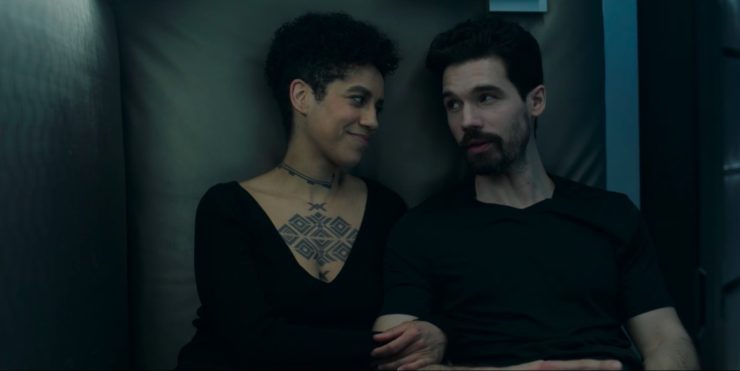
I don’t want to call Naomi Nagata the heart of The Expanse, because this is a show with a lot of heart to go around. But Naomi has been an engineer in more ways than one. Think of her talking Lucia down in season four, or her desperate plan to save her friends–and maybe herself—last season, when she was trapped on a rigged-to-blow ship. She puts things together. She does math-math and people-math. Her friendship with Drummer has been a constant, and that too is something that’s mattered, on story and character levels, again and again. She’s the one who figures things out and figures people out, while Amos is Amos and Holden makes sweeping decisions because he’s the captain and he has to. She was a great character on the page, and Dominique Tipper brought even more layers to her. Her whole arc, from prickly and defiant to strong and certain and wise, is a gorgeous, resonant slow burn.
Sometimes I think about an early ad for The Expanse, a poster I saw everywhere that showed Julie Mao floating in space with a tagline that read “We’ve gone too far.” This made it sound like The Expanse was another story about how space is scaaaaary, how we should be afraid of whatever else is out there. I didn’t want to watch the show that those posters seemed to be advertising. But I’m so glad I watched The Expanse, which is something else entirely.
What wasn’t clear, back then, was that it was the “we” that mattered. We as in people. We as in the people who took alien technology and immediately tried to make weapons out of it. We as in humanity, replicating the cruelty and oppression of Earth on a system-wide scale. And we as in the people who can still change, still make better choices, still learn when to make decisions and when to step aside. The Expanse is bleak and it’s hopeful, and this ending is in keeping with how the books end—lighter, with fewer losses, but with just the right tone.
I’m really going to miss this show.
Molly Templeton lives and writes in Oregon, and spends as much time as possible in the woods. Sometimes she talks about books on Twitter.










